Iran’s Hardliners Attack Sunni Cleric For His Criticism
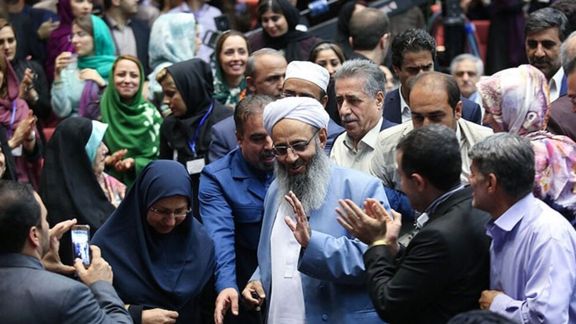
The Islamic Republic has upped the ante against the Sunni cleric of Zahedan for his harsh criticism of the brutal and non-democratic approach of the government to protests.

The Islamic Republic has upped the ante against the Sunni cleric of Zahedan for his harsh criticism of the brutal and non-democratic approach of the government to protests.
Tasnim News Agency, affiliated to the Islamic Revolutionary Guard Corps (IRGC), called Molavi Abdolhamid the source of insecurity in Sistan and Baluchestan, telling him to ask his “dictator Saudi friends to hold a referendum.”
Molavi Abdolhamid, who called for a plebiscite in Iran during his Friday prayer sermon November 4, wrote in a statement the same day, “Unfortunately, another crime was committed in Baluchestan and this time an unfortunate incident took place in the city of Khash in which protesters were killed in cold blood.”
His statement confirmed the “martyrdom of at least 16 people” and dozens of more injuries while teenagers and young people were chanting slogans and throwing stones at governor’s office in Khash, but they were “directly targeted by live rounds.”
He further called the “bloody tragedy in Khash” as well as the “Bloody Friday in Zahedan [September 30]” as the epitome of “the extent of oppression and discrimination” that he had warned against many times in the past.
The Sunni cleric asked the seminaries of Qom and the authorities to listen to the voice of the people and to “acquiesce to nation’s request, which is the main criterion.”

The Islamic Republic has at last admitted it has provided drones to Russia claiming that they were sent to Russia months before the Ukrainian war.
Iran’s Foreign Minister Hossein Amir-Abdollahian said Saturday Tehran provided Moscow with a limited number of drones months before the war in Ukraine, but if it is proven that Russia has used them in the war against Ukraine, the Islamic Republic will not be indifferent to it.
Previously, he had said, "Iran has not provided any weapons to Russia for the war in Ukraine," implying that some arms were transferred, without referring to drones.
Amir-Abdollahian’s statement admitting supplying drones to Moscow came as Europe joined the United States on condemning Iran’s support for the Russian invasion of Ukraine.
The G7 foreign ministers meeting in Germany this week issued a statement demanding that Iran and Russia to be held accountable for “balatant violations” of UN Security Council Resolution 2231, which endorsed the 2015 Iran nuclear deal. The US, France, Germany, and the United Kingdom – G7 members along with Canada, Italy and Japan – have argued that any Iranian supply of military drones to Russia is a breach of the agreement, the JCPOA (Joint Comprehensive Plan of Action).
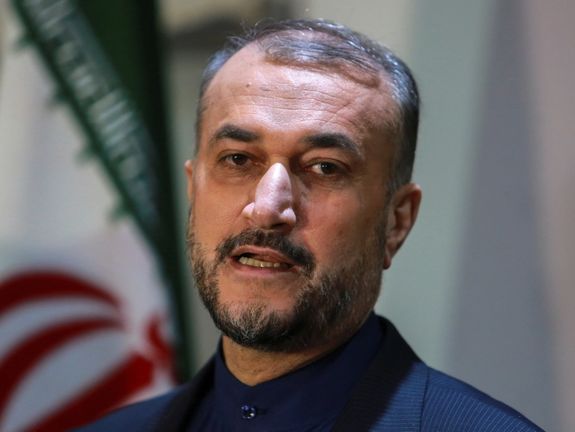
Iran’s supply of military hardware and reportedly technicians to help in their deployment to battle fields has further put in doubt further negotiations to restore the JCPOA. After 18 months of multilateral talks, the diplomatic effort reached an impasse in August, with the US saying that Iran was presenting demands outside the scope of the 2015 deal.
Washington has pledged more sanctions related to Tehran supplying weapons to Russia as fierce popular protests have rocked Iran since mid-September, further plunging its weakened economy into crisis.
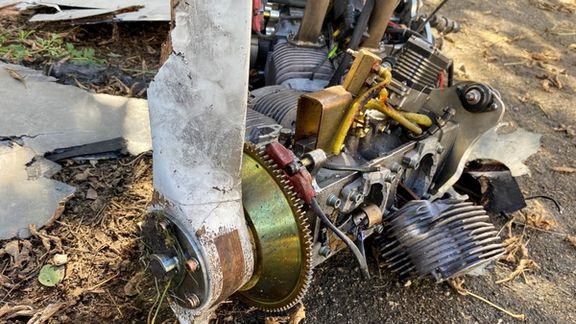
On the sidelines of a meeting in Tehran, Iran’s top diplomat also rejected supplying missiles to Russia saying, “we agreed with the foreign minister of Ukraine that if they have any documents on Russia’s use of Iranian drones in Ukraine, they should provide them to us.”
He further added that Iran’s position regarding the war in Ukraine “is to stop the war, return the parties to negotiations and return the refugees to their homeland.”
Ukraine has reported a spate of Russian attacks using Iranian-made Shahed-136 drones in recent weeks. Iran was so far denying supplying the drones to Russia, and this week, Iran’s Ambassador to the United Nations Amir Saeid Iravani rejected the accusations saying they are “totally baseless”.
Amir-Abdollahian’s comments come after the United States and its allies urged the UN to probe if Moscow has used Iran-made drones to attack Ukrainian infrastructure and civilian targets.
Ukraine’s Intelligence Directorate said Tuesday that the Islamic Republic is going to deploy over 200 combat drones to Russia in early November including Shahed-136, Arash-2 kamikaze drones, and Mohajer-6 reconnaissance and combat UAVs.
CNN also reported on Tuesday that Western officials believe Tehran was preparing to send nearly 1,000 additional weapons, including ballistic missiles and
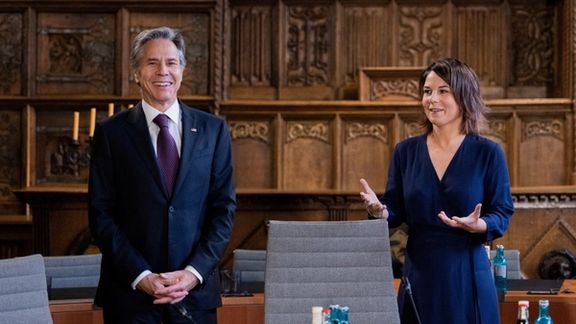
Iran sits amid a crowded agenda at the G7 meeting in Munster, Germany, as the bloc grapples with multiple challenges centered on Ukraine.
After tensions during the Donald Trump presidency, the two-day gathering concluding Friday shows a tight relationship between the United States and Germany, currently chairing the G7 bloc that also includes Canada, France, Italy, Japan and the United Kingdom.
German foreign minister Annalena Baerbock, from Alliance 90/The Greens, has spoken out over protests in Iran since mid-September, and Thursday Berlin warned citizens in Iran to leave due to a “concrete risk of being arbitrarily arrested.” In another sign of deteriorating relations, Iran-Iraq war veterans gathered outside the German embassy in Tehran this week to highlight German firms helping Saddam Hussein with chemical weapons.
At a US-German Futures Forum Friday in Munster with Antony Blinken, Baerbock described the US Secretary of State, whom she has met ten times since taking office ten months ago, as a friend. Blinken praised as “extraordinary” the “the leadership of the German foreign minister.”
Blinken said that in setting “rules for how technology is used,” the US and Germany had to “make sure that the values we stand for…carry the day.” He noted that the “vast democratization of information technology” and highlighted recent US decisions to lift any threat of sanctions against those supplying internet-access technology to Iran.
Baerbock referred to opportunities for online education she had recently seen in Egypt, where the COP27 United Nations climate conference begins Sunday. The German foreign minister said the G7 meeting had linked information technology to “democracy and freedom,” which she said underlay Berlin’s approach to Iran.
Baerbock pledged to bring “atrocities” to UN bodies and said “democratic economic powers” needed a majority on UN human rights bodies. The US has called for Iran to be removed from the UN Commission on the Status of Women.
In recognition of recent blows to Germany and European Union expectations of trade bringing states together politically – which underlay both Russian energy supplies and the 2015 Iran nuclear agreement – Baerbock said “we have learned” this was not always true.
Tanks, jets, drones
The US and Germany, respectively the largest and second largest arms supplier to Kyiv, appear to be the same page over Ukraine. Wary of Russian escalation, both have resisted calls for advanced weapons, with Ukraine seeking Leopard 2 tanks and Marder armored infantry vehicles from Berlin, and F-16 jets from Washington.
The US and Germany, along with France and the UK, have raised the issue of Iranian-made drones at the UN Security Council, arguing that any supply contravenes the 2015 Iran nuclear agreement and justifies ‘snapback’ of UN sanctions on Tehran. Given vagaries over ‘snapback,’ and experts’ disagreements as to whether drones as relatively light weapons violate the 2015 agreement, the move may be intended to deter Iran from sending missiles.
In an interview with Dubai-based al-Arabiya published Friday, Rob Malley, the US Iran special envoy, said Iran was “embarrassed” as it had become “clear to the world” that it had “sided with Russia and its war of aggression against Ukraine.”
Domestic criticism
Further underlying US-Germany cooperation is shared experience of center-left governments facing domestic criticism. With US aid to Ukraine at $50 billion so far, House minority leader Kevin McCarthy last month ruled out a “blank check,” and some Republican candidates in November 8 Congressional elections are critical of such support for Ukraine when Americans face rising bills. In Germany opposition politicians have queried the €200 billion allocated to citizens and companies over energy price hikes due to the Ukraine war.
A further complication facing both the German-US relationship and the G7, is the rise of China. While the US has cautioned other countries over Beijing’s involvement in key sectors, German Chancellor Olaf Scholz, a Social Democrat, arrived in China Saturday seeking “economic ties as equals, with reciprocity.” Chinese-made parts in globally manufactured items may include some, alongside European and US components, in Iranian drones, the Institute for Science and International Security said in a recent report.
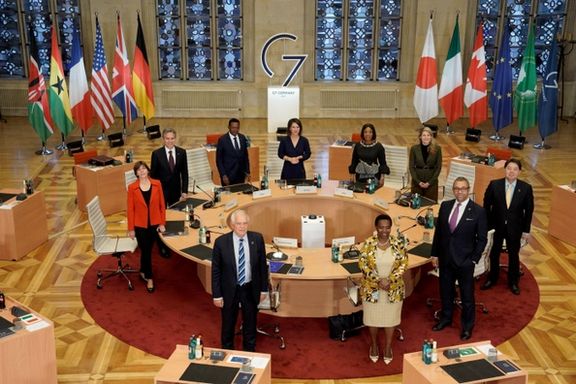
The G7 foreign ministers meeting in Germany concluded its busy two-day agenda Friday with a 3,500-word statement including a 500-word section on Iran.
Stressing the importance of universal human rights, the bloc called on Iran to honor international law, including the International Covenant on Civil and Political Rights, the General Assembly resolution adopted in 1966 and in force since 1976.
The wide-ranging G7 statement expressed support for efforts at the United Nations to hold both Iran and Russia accountable for “blatant violations” of UN Security Council Resolution 2231, which endorsed the 2015 Iran nuclear deal. The US, France, Germany, and the United Kingdom – G7 members along with Canada, Italy and Japan – have argued that any Iranian supply of military drones to Russia would breach the agreement, the JCPOA (Joint Comprehensive Plan of Action).
As the G7 statement held Iran responsible for not making the “necessary decisions” needed in international talks to restore the JCPOA, the American network CNN Friday cited “US intelligence officials” claiming Tehran had sought Russian help in acquiring “additional nuclear materials and with nuclear fuel fabrication” should JCPOA talks fail.
Russia has consistently expressed support for the JCPOA, and alongside China and three western European signatories criticized the US over its 2018 withdrawal, prompting Iran by 2019 to begin expanding the program. CNN gave no details of the assistance Iran had reportedly sought, nor why it needed Russian help given it is already enriching uranium to 60 percent and has stockpiled uranium well in excess of JCPOA limits.
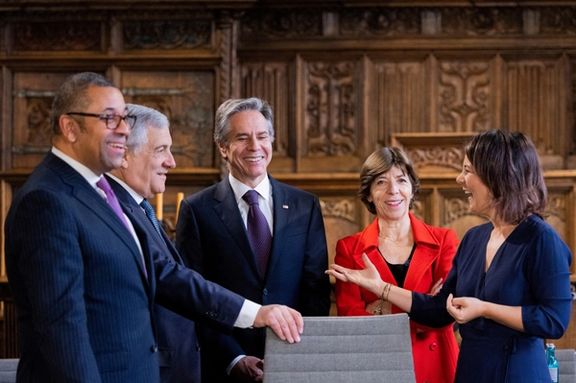
While not confirming the CNN story, National Security Council spokesperson Adrienne Watson told the network the US was “working with partners to expose the growing ties between Iran and Russia – and hold them accountable.” She said that while “the JCPOA is not on the agenda… we will be firm in countering any cooperation that would be counter to our non-proliferation goals.”
‘Unabated expansion’
While the G7 statement expressed concern at the “unabated expansion of Iran’s nuclear program, it made no specific reference to the JCPOA while calling on Iran to “fulfill its legal obligations and political commitments in the field of nuclear non-proliferation without further delay.”
The statement pledged to continue work between the G7 and “other international partners…to address Iran’s nuclear escalation and insufficient cooperation with the IAEA [International Atomic Energy Agency] regarding its [Nuclear] Non-Proliferation Treaty (NPT) safeguards agreement.” One of the issues holding up progress in JCPOA talks has reportedly been Iran’s demand that the IAEA drop a probe into unexplained uranium traces found in sites related to Iran’s nuclear work before 2003.
The G7 statement also condemned Iran “destabilizing activities in and around the Middle East,” including “transfers of…advanced weaponry to state and non-state actors,” apparently a reference to Iran’s links with Syria’s President Bashar al-Assad, Hezbollah in Lebanon, armed Palestinian groups, and Ansar Allah in Yemen.
The statement deplored “the Iranian government’s erosion of civil space, and independent journalism, its targeting of human rights defenders, including by shutting down the internet and social media.” It urged Iranian authorities to “treat women as equal, respecting the universal rights provided to them under the relevant international human rights treaties.” It called for the release in Iran of “unjustly detained prisoners, including recently arrested protesters, children, journalists and human rights defenders, and... accountability for perpetrators of human rights violations and abuses.”

A former parliamentary leader In Iran says the occupation of the US embassy in Tehran in November 1979 was an ‘unnecessary’ action probably done under direction of the Soviet embassy.
Outspoken conservative politician Ali Motahari, who was deputy-speaker in the previous parliament, made the comment in a tweet on Friday, as the regime sponsored pro-government rallies across the country to commemorate the occupation of the US embassy and taking dozens of American diplomats hostage for 444 days.
The former senior lawmaker, who has often criticized hardliners in recent years, said the attack on the embassy and taking hostages for such a long time was carried out by a leftist group of individuals “that diverted the Islamic Revolution from its original path.”
He added that the hostage crisis made it difficult to present the Islamic Revolution to the world and paved the ground for the Iraqi invasion of Iran under Saddam Hussein.
On the fourth of November 1979, a group of radical students who were followers of Ayatollah Ruhollah Khomeini stormed the US Embassy in Tehran and took 52 US diplomats and citizens hostage, marking the moment as the start of Iran’s hostage diplomacy. Since then, Iran has detained many dual nationals visiting the country and has used them as bargaining chips against Western countries, human rights organizations have said.

While FIFA urged teams to avoid political battles, a former Iran national footballer has called on fans not to travel to Qatar to watch FIFA World Cup matches.
Sosha Makani, the ex-goalkeeper of Iran’s national team said in a video on his Instagram on Thursday that it’s wrong to go to Qatar to watch football matches because the Iranian regime will exploit their presence in stadiums to tell the world they are support the Islamic Republic.
Referring to the brutal killing of Nika Shakarami by government security forces, he stressed that Iranians must use every chance to tell the world the Islamic Republic is a “child killer”.
“This government and its filthy supporters murder a 16-year-old girl and to evade the consequences throw her off a building, so don’t you think they will exploit your slogans at the World Cup? Use your tribunes to shout, “Death to the Child-killing Islamic Regime,” he added.
Nika Shakarami’s body was found in suspicious circumstances ten days after she left home to take part in a protest rally against compulsory hijab on September 20. Authorities claimed that she was thrown off a roof or jumped to her death after taking part in the protests.
FIFA President Gianni Infantino on Thursday wrote to the World Cup teams asking them to concentrate on soccer in Qatar and not let ideological “battles” be dragged into football fields.
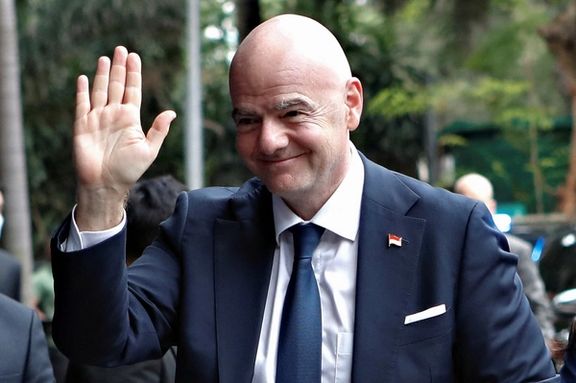
“We know football does not live in a vacuum and we are equally aware that there are many challenges and difficulties of a political nature all around the world… [but] at FIFA, we try to respect all opinions and beliefs, without handing out moral lessons to the rest of the world,” Infantino said in his letter.
As 2022 World Cup kicks off in almost two weeks, a group of Iranian sportspeople said due to regime’s violence and discrimination they have no other choice but turn their backs to their national team.
Theses former karate, wrestling, and judo champions sent a letter to FIFA last week urging that the Islamic Republic be expelled from the tournament.
Ex-wrestling champion Sardar Pashaei who was one of the signatories said, “Iran is different from any other country. A football federation should be independent, but in Iran, it's a joke.”
“Everything is controlled by the Revolutionary Guards. Enough is enough. We believe that Iran is killing protesters. They should be banned until we have a democratic country like any other country in the world,” underlined Pashaei.
Former and current Iranian national football players including Ali Karimi, Ali Daie, Medhi Mahdavikia, Merhrdad Pouladi, Sardar Azmoun, Hossein Mahini, Voria Ghafouri and Aref Gholami were among the athletes raising their voice against the government crackdown on protesters.
Ali Karimi was one of the first celebrities who condemned the death of Mahsa Amini. Since then, Karimi has voiced support for protesters on social media becoming an icon for them.
Soccer legend Ali Daei also called on the government to “solve the problems of the Iranian people rather than using repression, violence and arrests.”
He also rejected the narrative of the regime regarding the death of a 15-year old girl in her birthplace Ardabil saying he does not believe Asra Panahi had died of heart failure and dismissed as “rumors” that she had taken her own life.
Mehdi Mahdavi Kia, on Friday lashed out at the government on his Instagram page saying “Shame on those who divided the country into insiders and non-insiders.”